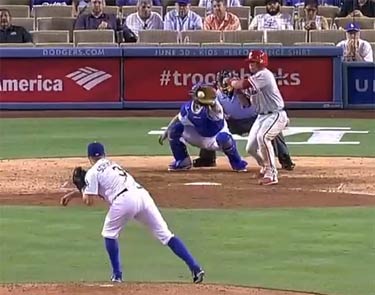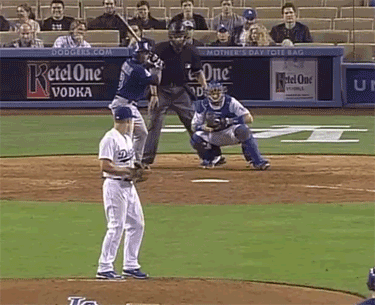"Of course for Philadelphia, I mean they're not fooling around even though they have 16 runs. Every base hit, that's food on the table. You think Ruiz doesn't have the idea right now as if it's the big at bat in the World Series? He sees a couple of ribbies out there." — Vin Scully
The goal of a hitter is (except in the few situations that call for altruism) to produce big numbers. The obstacle in the hitter's way is the pitcher, who is exceptionally skilled at suppressing big numbers. Every so often, the obstacle goes away and is replaced by Skip Schumaker. To help you keep these things straight:
Hitter : Super Mario :: Skip Schumaker pitching : Invincibility star
Every hitter has the advantage against Skip Schumaker pitching; he might get some people out (Batter against Skip Schumaker : Mario with Invincibility star :: striking out : running off a cliff) but he is persistently worse than the hitter. Hitters against Skip Schumaker should produce big numbers. And, just as with the invincibility star, the advantage wears off. Most players will never get to hit against Skip Schumaker, or against any position player on the mound. You only get one shot. Do not miss your chance to blow, this opportunity comes once in a lifetime.
yo.
And so here’s the weirdest thing:


That's Carlos Ruiz taking a 2-2 pitch from Schumaker. It was called a ball, and it was rightly called a ball, a little bit high. Ruiz shouldn't have necessarily counted on it being called a ball. A few pitches earlier, Delmon Young took a first-pitch "cutter" that was more than four inches outside, and the umpire half-heartedly called it a strike.
But even getting past the fact that Carlos Ruiz was apparently perfectly willing to risk being called out on strikes against Skip Schumaker is the fact that Ruiz wasn't dying to swing at that pitch, and at any pitch Schumaker threw near him, with two runners in scoring position and two outs in a game his team led by 15 runs. He's not alone. The morning before Schumaker pitched in this game, I happened to be looking at o-swing rates for pitchers. Schumaker, who had pitched earlier in the season against the Rockies, was the only pitcher in the game with an o-swing rate of zero. Nobody expanded the zone even a little bit against him in the first outing.
I don't know who would be happy watching batters take close pitches in this situation. Here's Mark McGwire after Ruiz's take above:

After this take by Jonathan Herrera,

we got this reaction by superfan [name unknown]:

And after John Mayberry took this 3-2 pitch

we got the longest Pitcher Face shot I've ever seen, the full length of which is actually about 20 percent longer than you see here:

So why do these batters take these pitches? My guess is that Ted Williams answered this question when he was asked why he didn't expand his zone in situations where a hit was more valuable than a walk. From Leonard Koppett's "The Thinking Fan's Guide to Baseball,"
He insisted that "good habits" were the primary consideration for a hitter, and that the best habit was knowing exactly what the strike zone was an absolutely refusing to swing at anything outside of it. If you gave in once, Williams believed, and compromised swinging at a pitch just a little outside the strike zone, you would do it again. You might hit some of those pitches safely, but you would be undermining your self-discipline and your reflexes, which were more important in the long run.
There have been, as far as I can tell, five position players who have pitched this season: Schumaker (twice), Casper Wells, David Murphy, Alberto Gonzalez, and Anthony Recker. They have thrown 106 pitches, just 44 in the zone. Of the 62 wayward throws, batters have swung at just 11 — or, at 18 percent, well, well below the league average, around 30 percent. Of course, we would expect batters to have the ability to swing at far fewer pitches outside the zone against these non-pitchers. They're not seeing good breaking balls or high velocity, so they won't be fooled nearly as often, and non-pitchers miss by much larger margins than pitchers, so many of these balls are awful balls. On the other hand, we might expect batters to choose to swing at far more pitches outside the zone, especially considering that these games are the tail end of blowouts, played before just a handful of fans, against a pitcher who would probably appreciate some mercy. Unwritten rules alone, you would figure, would dictate swings, even if personal ambition isn't enough.
Shoot, maybe the unwritten rules go just the opposite way, and a home run against a non-pitcher is distasteful. Y'all can do whatever you want, what do I care. SMDH baseball.
Thank you for reading
This is a free article. If you enjoyed it, consider subscribing to Baseball Prospectus. Subscriptions support ongoing public baseball research and analysis in an increasingly proprietary environment.
Subscribe now